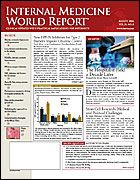Publication
Article
New Cancer Screening Guidelines Urge Periodic Patient Examination
Author(s):
CA
A Cancer Journal for Clinicians
Women at average risk of breast cancer should undergo clinical breast examination (CBE) and counseling beginning at age 20 years and annual mammography beginning at age 40 years, according to new guidelines for early cancer detection issued by the American Cancer Society (ACS) (: . 2006;56:11-25).
The new guidelines address early detection of breast, colorectal, prostate, cervical, and endometrial cancers and cancer-related checkups during periodic health examinations.
"The tests that currently are recommended represent the most advanced proven technology for early cancer detection," said Robert A. Smith, PhD, director of cancer screening at the ACS. "However, new technology is under evaluation for each of the major cancers, including stool DNA testing and computed tomography colonography for early colorectal cancer detection, magnetic resonance imaging for early breast cancer detection in high-risk women, and vaccines against human papillomavirus to prevent cervical cancer."
The guidelines note changes in cancer screening between 2002 and 2004, including a drop in the number of women undergoing frequent mammography and women having a recent Pap smear test, and in the use of at-home fecal occult blood testing. In contrast, the prevalence of recent endoscopy screening for colorectal cancer increased during this time.
IMWR
"The only controversies in cancer screening worthy of serious attention relate to cost-effectiveness and the soundness of the underlying scientific evidence to support screening recommendations," Dr Smith told . "These include the age to begin screening, the frequency of screening, and the age to stop screening."
The rate of false-positive results is a major issue when formulating cancer screening guidelines. In the United States, malpractice concerns may have a significant impact on false-positive findings. And different organizations advocate different frequencies for routine screening.
The ACS no longer recommends that all women conduct regular breast self-examinations, and advises that women who choose to perform the procedure should receive instructions and a review of their performance. Digital mammography may be a useful alternative to screen-film mammography in younger women and those with dense breast tissue.
Cervical cancer screening guidelines remain the same but may need to be revised as a result of the approval of the new vaccine against cervical cancer.
For the early detection of adenomatous polyps and colorectal cancer, the guidelines recommend that adults at average risk begin colorectal cancer screening at age 50 years, using 1 of the 5 options listed in the Table.
Testing of stool acquired during a digital rectal exam (DRE) for occult blood is specifically discouraged because of the unacceptable rate of false-negative results.
Early prostate cancer detection is emphasized; annual screening with the prostate-specific antigen (PSA) assay and DRE should begin at age 50 for men who have a life expectancy of at least 10 years. The PSA assay alone is considered an acceptable alternative when DRE is an obstacle to testing.
No organization currently recommends testing for early lung cancer in asymptomatic individuals at risk for lung cancer, and the ACS calls for informed decision-making among at-risk persons who seek testing. But mounting evidence shows possible benefits from early lung cancer detection using spiral computed tomography.
Physicians should perform or refer for appropriate cancer screening tests, discuss self-examination techniques, and counsel about cancer, its symptoms, and the role of lifestyle factors.
"Because healthcare is not organized in the United States, individual clinicians face the challenge of setting up office systems to identify which patients should receive screening, when the last test was performed, and when the next test is due," Dr Smith said, reminding physicians that "patients depend on their clinician to provide advice about cancer screening. Over and over again, studies have confirmed that the most important factor in whether or not an adult has had recent cancer screening is the advice they receive from their physician."
Cancer Drugs on the Horizon
Two cancer agents have received fast-track designation from the FDA, and a third has been granted priority review.
? The first fast-tracked designation was given to sorafenib (Nexavar; Bayer), intended for the treatment of metastatic hepatocellu-lar carcinoma. This agent was approved in 2005 for the treatment of advanced renal-cell carcinoma.
? The second fast-track designated drug is a biologic called My Vax (Genitope) personalized immunotherapy, which is being considered for the treatment of follicular non-Hodgkin's lymphoma.
? Priority review has been granted for panitumumab (Amgen), an investigational fully human monoclonal antibody that targets the epidermal growth factor receptor. It is intended to be used for the treatment of metastatic colorectal cancer in patients who have not responded to other chemotherapeutic regimens, including those that contain oxaliplatin (Eloxatin) and/or irinotecan (Camptosar).






